We overlook them at times but resistors are the nuts & bolts of any circuit board. As the name implies, resistors reduce (or resist) the flow of electrical current from one region to another. The amount of resistance to the flow of current that a resistor causes depends on the material it is made of as well as its size and shape. With all the resistor manufacturers and types available, it can be difficult to decide which resistor is right for a certain application. This article describes some common resistors, their properties, identification methods, and the applications they are used for.
Common Terms
Tolerance
Measure of how precise a resistor is. A resistor with a value of 100 Ω might have a tolerance such as ±5%. This means that any resistor with a value in the range 95 Ω to 105 Ω is acceptable.
Temperature Coefficient (TC)
Measure of change in resistance as temperature is varied. A high TC means resistance varies more as temperature varies.
Rated Voltage
Maximum value of DC or the maximum root-mean-square value of AC that can be continuously imposed to the resistor at specified ambient temperature.
Resistor Types
Basically, there are two types of resistors - fixed and variable. Fixed resistor values essentially do not change, while variable resistor values can change depending on a number of factors. Potentiometers are examples of a variable resistor. This article focuses on common fixed resistors.
Carbon film resistors
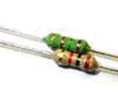 This type of resistor incorporates a solid ceramic core coated with carbon film that has electrical resistance properties. It is the most general purpose, cheap resistor. It has a poor TC. Usually the tolerance of the resistance value is ±5%. Power ratings of 1/8W, 1/4W and 1/2W are frequently used. Typical applications include their use as a collector or emitter load, in transistor/FET biasing networks, as a discharge path for charged capacitors, and as pull-up and/or pull-down elements in digital logic circuits.
This type of resistor incorporates a solid ceramic core coated with carbon film that has electrical resistance properties. It is the most general purpose, cheap resistor. It has a poor TC. Usually the tolerance of the resistance value is ±5%. Power ratings of 1/8W, 1/4W and 1/2W are frequently used. Typical applications include their use as a collector or emitter load, in transistor/FET biasing networks, as a discharge path for charged capacitors, and as pull-up and/or pull-down elements in digital logic circuits.
Metal film resistors
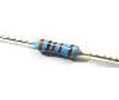 Metal film resistors are used when a higher tolerance is needed (usually around ±0.05%). They have long-term stability, low to very low TC, low changes in resistance due to soldering, can work at low temperatures, and have low voltage coefficients. Metal film resistors are used for bridge circuits, filter circuits, and low-noise analog signal circuits. They are not suitable for high frequency circuits.
Metal film resistors are used when a higher tolerance is needed (usually around ±0.05%). They have long-term stability, low to very low TC, low changes in resistance due to soldering, can work at low temperatures, and have low voltage coefficients. Metal film resistors are used for bridge circuits, filter circuits, and low-noise analog signal circuits. They are not suitable for high frequency circuits.
Wirewound resistors
 These are made by winding thin wire onto a ceramic rod. They can be made extremely accurately for use in multimeters, oscilloscopes and other measuring equipment. Some types of wirewound resistors can pass large currents without overheating and are used in power supplies and other high current circuits.
These are made by winding thin wire onto a ceramic rod. They can be made extremely accurately for use in multimeters, oscilloscopes and other measuring equipment. Some types of wirewound resistors can pass large currents without overheating and are used in power supplies and other high current circuits.
Ceramic resistors
 These are wirewound resistors in a ceramic case, strengthened with special cement. They have very high power ratings and can become extremely hot when used for high power applications. This must be taken into account when designing the circuit. Common applications include impulse generators, charge-discharge of capacitors, x-ray generators, high frequency circuits, surge absorption, and high-voltage circuits.
These are wirewound resistors in a ceramic case, strengthened with special cement. They have very high power ratings and can become extremely hot when used for high power applications. This must be taken into account when designing the circuit. Common applications include impulse generators, charge-discharge of capacitors, x-ray generators, high frequency circuits, surge absorption, and high-voltage circuits.
Chip resistors
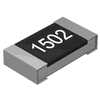 Thick film chip resistors are the least expensive chip resistors. They are used in applications ranging from automotive sensors to high frequency microwave transceivers to medical equipment.
Thick film chip resistors are the least expensive chip resistors. They are used in applications ranging from automotive sensors to high frequency microwave transceivers to medical equipment.
A thin film chip resistor or resistor array is more expensive than a thick film resistor, but has better electrical properties and good TCs. In applications where temperature coefficient (with thin film, coefficients lower than 25 ppm/C are possible) is important thin film chip resistors may be used. The advantage of a chip resistor network includes smaller space requirements, high accuracy via laser trimming, tight TC resistance matching, and good temperature tracking.
Resistor Networks
This is a group of resistors assembled in one piece. They are most commonly available in through-hole SIP, surface mount (SMD), and chip arrays. Because of the variety of types, they can be used for all the applications of the previous types mentioned in this article. One example of their use would be to control the current in a circuit powering an array of LED's.
 |
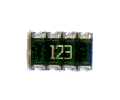 |
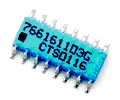 |
| Through-Hole SIP |
Chip Array |
SMD |
Resistor Values
Resistors are manufactured in values from a few milliohms(mΩ) to about a gigaohm(GΩ), even up to a teraohm(TΩ) only a limited range of values from the IEC 60063 preferred number series are commonly available.
The E6 series (6 values for each multiple of ten, for resistors with 20% tolerance):
10, 15, 22, 33, 47, 68, 100, 150, 220, 330, 470, 680, 1000 etc.
Notice how the step size increases as the value increases. For this series the step (to the next value) is roughly half the value.
The E12 series (12 values for each multiple of ten, for resistors with 10% tolerance):
10, 12, 15, 18, 22, 27, 33, 39, 47, 56, 68, 82, 100, 120, 150 etc.
Resources
http://www.iihr.uiowa.edu/~hml/people/kruger/Publications/ChipCenter/Resistors01.pdf
http://library.thinkquest.org/C006657/electronics/resistors.htm
http://www.kpsec.freeuk.com/components/resist.htm
http://www.interq.or.jp/japan/se-inoue/e_resistor.htm
http://www.convertworld.com/en/electrical_resistance/